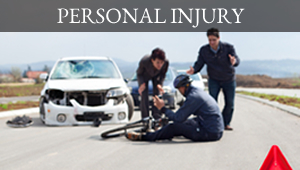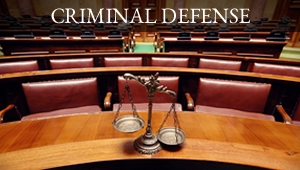Personal Injury FAQ
What is personal injury?
Personal injury is any physical or mental injury to a person caused by another person’s negligence or harmful act. A personal injury case generally involves private parties bringing their claims pursuant to state tort law. A tort is a bad act or mistake made by a person or legal entity. The person or entity that perpetrated the bad act is legally known as the tortfeasor. Tortfeasors can be held accountable for their bad acts.
Personal injuries happen in many ways. Here are some of the most common accidents or incidents that result in personal injury:
- Auto accidents
- Other vehicle accidents (motorcycle, bicycle, truck, boat and watercraft, railroad, aircraft)
- Burns
- Construction site or on-the-job accidents
- Dangerous or defective products
- Dog/animal bites
- Fights, shooting, assault, or other harmful attack
- Medical malpractice (birth injuries, misdiagnosis, surgical negligence)
- Elder abuse and neglect
- Sexual assault
- Slip or trip and fall
- Toxic chemicals or substance exposure
How can I recover money in a personal injury case?
In the state of Washington, personal injury victims are legally entitled to recover monetary damages for all losses caused by and expenses incurred as a result of an accident or intentional act. “Damages” is a legal term that means money is paid to the injured party as compensation for the harm done. Depending upon the facts of your case, your damages may include recovery for any of the following:
- Medical bills for treatment
- Medicines and supplies, prescription and over-the-counter
- Lost work income, including overtime
- Travel expenses to and from the doctor or other provider
- Property damage
- Physical disability
- Disfigurement or scarring
- Emotional trauma
- Mental disability
- Pain and suffering
What is the statute of limitations?
It is the time limit within which you must file a personal injury lawsuit. In some states, for example, you may have as little as one year to file a lawsuit from an automobile accident. When the statute of limitations expires on your case, you are a barred from ever bringing a lawsuit.
Statutes of limitations differ not only from state to state, but also depending on the kinds of lawsuits involved. In some states the statute of limitations for medical malpractice, lawsuits against governmental agencies, and wrongful death actions is shorter than that for other types of personal injury cases. In general, however, the statute of limitations for personal injury cases is from two to three years, beginning from the time of the accident that caused your injury.
How long will it take to settle my claim?
The time it takes to settle a personal injury case depends on the facts of your case. The more complex the case, the longer it may take to settle. Many cases can take anywhere from 3 to 18 months to settle depending on their complexity. In the event a lawsuit is filed on your behalf the time to settle will be longer.
What if the person who hurt me committed a crime?
In the event someone committed a crime, the decision to prosecute that person for breaking the law would be made by a city, state or federal government prosecutor. This is very different from a civil personal injury case. Nonetheless, a person injured by someone who committed a crime may have a personal injury case against the tortfeasor. Also, if there is a criminal case pending against the person who hurt you, this may increase the likelihood that you will win your civil case.
What is wrongful death?
Wrongful death is a legal term that describes what happens when a person’s death was caused by the negligent, reckless, or wrongful act of another. Examples range from negligent driving to murder. The people who depended upon the deceased for financial or emotional support may be entitled to compensation for the wrongful death. They may be able to claim damages from whoever caused the person’s death. The State of Washington enacted a wrongful death statute that permits the relatives of a person who died as a result of a wrongful act to bring a lawsuit against the person who caused the death.
How does wrongful death occur?
Wrongful death law provides financial compensation to the family of a person whose death was caused by the negligent, willful or wrongful act of another. Wrongful death cases are filed as a result of a variety of situations, including:
- Automobile, bus, train, airplane, ship or other common carrier fatality accident
- Occupational exposure to hazardous conditions or substances (exposure to radiation, asbestos, or toxic substances) resulting in death
- Death during a supervised activity (sports tournament or field trip)
- Medical malpractice resulting in a patient’s death
- Neglect or abuse on the part of a care giver or facility that results in an elderly or disabled patient’s death
Who can file a wrongful death lawsuit?
A wrongful death case alleges that the decedent was killed as a result of the negligence of the bad actor, and that the decedent’s immediate family members are legally entitled to monetary damages as a result of the bad actor’s conduct. Commonly a surviving spouse and children, and sometimes parents are the parties bringing the wrongful death lawsuit.
What is medical malpractice?
Medical malpractice is negligence committed by a professional health care provider – a doctor, nurse, dentist, technician, hospital or hospital worker – whose performance of duties falls below the standard of care of those with similar training and experience, resulting in harm to a patient or patients.
How much does Kannin Law Firm charge for personal injury or wrongful death counsel?
Mr. Kannin helps injured people get justice by recovering money for them. Kannin Law Firm’s fee agreements are designed to meet our client’s needs while ensuring we get paid for the work we do. Each case is unique and the firm uses a variety of agreements to accommodate our clients. Generally our fee agreements in personal injury cases involve one or more of the following forms of payment:
- Contingency fee
- Retainer
- Deposits
- Flat fees
- Billable hourly rates
Kannin Law Firm works to get justice for you at a price you can afford. There are no hidden costs. You will be informed of the fee structure for your case during your first meeting with John Kannin. If you have been injured there is no fee to meet with us to find out more about what your rights are and how you may be able to recover money from the person or organization that hurt you.
If your case is suitable for a contingency fee then you pay our attorney’s fees only if we recover money for you.
If you or someone you know in greater Seattle or other areas of Washington State needs the assistance of a skilled personal injury trial lawyer, contact Kannin Law Firm at 206.257.7950 or complete the contact form provided on this website to schedule your free initial consultation.
NOTICE
The information provided in this website has been prepared by Kannin Law Firm for informational purposes only, and does not constitute legal advice or counsel. You should not rely solely upon the information contained in this site or act upon any information contained herein without first seeking professional legal counsel. A written fee agreement must be signed by both the client and Kannin Law Firm to create an attorney-client relationship.



